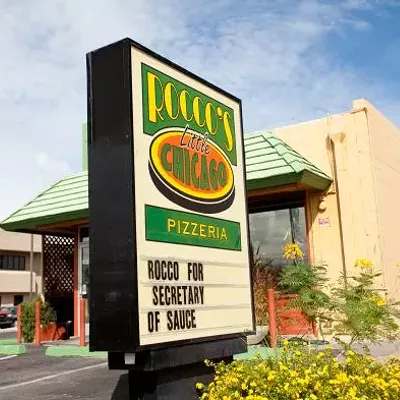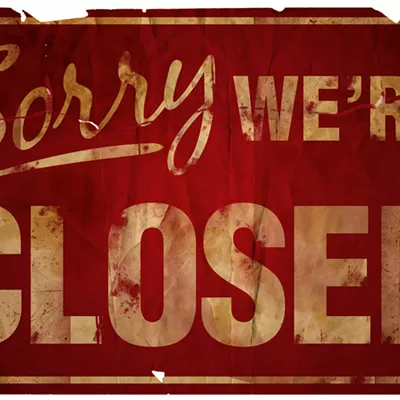So, on Friday, November 19, 1999, just before noon, about 400 packers and plant workers walked off the job--out of the hydroponic greenhouses of the EuroFresh company near Willcox. There was nothing prearranged or planned about it. No picket signs, strike captains, bullhorns or soup kitchens. No union strike fund. In fact, no union. Just exasperation. Enough was enough!
Once they were out and milling around, as an afterthought, it occurred to a few that having a bona fide union might be a good idea. So, over the weekend, they found a yellow-pages phone book and searched through it for a union that would represent them. All but a handful were Mexicans with little experience of unions. But one name seemed to leap out of the phone book pages: United Food and Commercial Workers Union Local 99. Food! That was it!
As it turned out, it was the perfect choice. UFCW 99 already represented workers at Albertson's, Fry's, Safeway and Smith's. In addition, it had members at Sun Land Beef, the Arizona Sonora Desert Museum, the Southern Arizona Legal Aid Society, Waste Management and Community Legal Services. It was--and is--a catchall union with an emphasis on food.
"They called us and we rushed a few people down," said Paul Rubin, the Southern Arizona assistant director of UFCW. "We got there and said, 'Wow, this is big.'" Rubin summoned several Spanish-speaking organizers from the local's headquarters in Phoenix. "We immediately started to do all kinds of things. But fortunately, someone said, 'We'd better check the law first.'"
The law--the Arizona Agricultural Employee Relations Act--as they discovered, had been written by the heavyweights of the Arizona agricultural industry. Its unvarnished intent was to put the kibosh on Cesar Chavez's farm workers' union, which had attempted to organize migrant farm laborers on Arizona's corporate farms during the 1970s.
Rubin realized the law clearly had jurisdiction over the EuroFresh workers and he decided his union had to tread carefully, especially since the walkout itself had created a minefield of legal problems. "We had to do it in such a way that it was not a strike for recognition [of the union]," said Rubin.
DESPITE THE UNION'S care, four of its organizers were arrested when what seemed like several platoons of law enforcement were summoned by the company. "At the end of the first week," said Rubin, "the workers had not been given their paychecks for work done before the strike. The gate was open and they went up to the office to demand their pay. There was no violence or anything of that nature. But someone freaked out and called the police. It was the kind of call that brings everyone to your rescue no matter what agency you are. Every vehicle from every agency showed up--SWAT teams, everything. I had been there earlier in the day, and I had just got back to Tucson when I got a call saying, 'You've got to go right back. There's all hell going on. Police dogs, armed police over nothing.' They put our organizers into a vehicle and took them to Safford to jail. We got them out and they were charged with trespassing. And it was off their record six months later."
However, progress was slow and, about 10 days after the walkout began, workers began "trickling back because they couldn't survive." So, Rubin decided a different strategy was needed. "We had a meeting of the workers and said, 'Why not go back to work? There are still methods under the law for us to get a union in there. Otherwise we're just going to lose.' So they went back to work and we filed a petition with the Arizona Agricultural Employee Relations Board."
The board found itself in deep water, since no petition for union recognition of agricultural workers had ever been filed (which indicates how effective the law has been at keeping out unions). In fact, the board was so inexperienced and unprepared it didn't have proper petition forms. "When we filed," said Rubin, "they didn't know what to do. They had hearings, which they had to create as they went along. Actually, they consulted the NLRB [National Labor Relations Board, a federal agency], who helped them during the process. The NLRB was there in an advisory capacity. No one had filed under this law in 30 years."
Despite the clumsiness of the procedure, the union won its representation election by an overwhelming margin in July, 2000.
The victory was emblematic of a seismic change within the AFL-CIO. Not long ago, AFL-CIO unions turned away Latinos, especially recent immigrants, whether or not they were legal. But, not long ago, union leaders woke up to the fact that Hispanics were filling most of the jobs that used to be heavily unionized. Meanwhile, membership across the country was declining almost exponentially. It was time to make a big change. Today, Spanish surnames are common not only among union members, but also among union leaders. For example, in the Tucson area, a Martinez, two Figueroras and an Encino lead four unions.
At the same time, the victory at EuroFresh also symbolizes a kind of union desperation. The 400 workers who became part of the UCFWA are small beer in a labor movement that once organized huge auto and steel plants. In those days, unions could afford to put platoons of organizers into a drive to sign up members. Nowadays, they must carefully husband their resources. "Today unions are forced to be strategic," said Mike Mulcahey, a graduate student in sociology at the University of Arizona who has worked with the AFL-CIO. "They're forced to not just react to expressions of interest on the part of workers, but have to manage their resources as tightly as possible. They have to try to look at the future and try to identify growth areas and growth sectors and organize in those."
IT BOILS DOWN TO a business-style decision: what kind of returns will an investment of organizing resources bring? For example, look at the local hospitality industry. Thousands of low-paid workers are employed in Tucson's resorts and casinos (one casino, alone, Desert Diamond, employs 700 waiters); yet the Hotel Employees & Restaurant Employees International Union in Tucson has only 65 to 70 members whose wages vary from $7.50 to $10.50--all at the Tucson airport. Jose Encino, secretary-treasurer of the HERE local in Phoenix, which covers Tucson, said there have been organizing drives in Tucson, going back several years. All of them failed.
On the other hand, the Union of Needletrades, Industrial and Textile Employees (UNITE) recently made a heroic effort to organize the relatively tiny workforce at the laundry operated by Mission Linen, part of a chain of industrial launderers and linen suppliers headquartered in Santa Barbara, Calif. The local branch of the company employs only 62, a unit whose size puts it at the bottom of the food chain for a major national union.
However, despite the miniscule size of the Mission unit, UNITE had a good reason for its organizing drive: it already represents more than 1,500 Mission workers in New Mexico and California and has just won an election in Phoenix. "We want to negotiate a master contract to cover all units," said Victor Caraballo, the lead organizer in Tucson. By bargaining on a company-wide basis, the union can get a better deal for its members. It's a negotiating principle practiced by all the big industrial unions--Auto Workers and Steelworkers, to name two.
UNITE is a union battered by the circumstances of today's economy. The union's predecessors (women's garment workers, men's apparel and textile unions) lost thousands of members' jobs to the industry's runaway strategy of foreign outsourcing. A look at the labels in most clothing today reveals that only a small number of garments are produced in the United States. UNITE's response has been to organize industrial laundries, distribution and retail operations, auto parts manufacturers and suppliers, copier manufacturing and others.
However, critics say economic shifts are not the only reason for unions' failure to grow. In recent years, "unions [have] shifted enormous resources, including organizing staff, to ... election campaign[s], leaving fewer staff and resources for organizing," according to Kate Bronfenbrenner, a professor at Cornell University. "After spending the past 14 years conducting a series of studies analyzing the factors contributing to union organizing success, I find ... [that] building capacity for organizing is one thing. Changing the structure, culture and strategy of the large, entrenched, democratic institutions that American unions have become is quite another."
Bronfenbrenner believes the obstacles to organizing are enormous. "While labor has finally begun to regroup, the economic, political and legal climate has only grown more hostile. Each year, employer anti-union campaigns increase in intensity and effectiveness. Discharges for union activity, plant-closing threats, intimidation, harassment and surveillance have become routine elements of the organizing process, so much so that fewer than a third of those attempting to organize succeed in gaining representation under a collective bargaining agreement."
Yet there are glimmers of hope. One of them is the AFL-CIO's decision to attract young, idealistic college graduates to its Organizing Institute. One of its recent alumni is Victor Caraballo, the lead organizer in the UNITE campaign at Tucson's Mission Linen. In his 20s, Caraballo originally came with his mother to New York from the Dominican Republic when he was 11. "My mother worked in a laundry, a UNITE shop. She became a shop steward and then a business agent." At first, Caraballo's ambition was to make lots of money. He graduated from Union College in Schenectady, N.Y., and got a job as a headhunter in New York, "working in a little cubicle. Made a lot of money." But he changed his mind when he attended a strike rally with his mother "and got into it. I fell in love with it." He was given an opportunity to work on an organizing drive. "It was minimal pay. But it was not about the pay for me. It was to see if I really liked it." He attended the Organizing Institute like "a lot of young people coming out of college, activists who want to make a difference."
Caraballo lived out of a suitcase in Tucson during the Mission drive that began in mid-February. He and his fellow organizers spent the first several weeks accumulating names and addresses of Mission workers and then learning how those workers felt about their jobs. When they started asking employees to sign "interest cards" to document their petition to the NLRB, "we got 57 signatures out of 65 workers within four days."
CARABALLO BELIEVES THE major difficulty for unions in Arizona is its right-to-work law. It requires unions to represent all workers within a bargaining unit, whether or not they are members. In other states, unions can negotiate "union shop" agreements, requiring all employees in the unit to join the union. In states like Arizona, supervisors often encourage employees to become "free-riders," obtaining the advantages of union services without paying for them. "Therefore, if you organize 70 workers and you end up with only 20 dues payers, you just figure hey, what's the use? They don't feel obligated." Caraballo thinks a great many unions are inclined to pass up Arizona as a bad risk.
Caraballo's organizing drive climaxed in an election, which the union won, by two votes. The company, however, challenged the results and a company spokesperson said she didn't know if Mission would accept UNITE as a bargaining agent for its employees. That could lead to a drawn-out legal battle, all for 62 workers.
Tucson's existing union landscape is uneven. One union with a relatively successful organizing history in Tucson is the American Federation of State County and Municipal Employees (AFSCME) Council 97. It represents workers at all state agencies in Tucson, including corrections officers, Pima County employees, blue-collar employees of the city, all El Rio Neighborhood clinic employees, workers at Brewster Center for Domestic Violence Services, Pima College employees and blue-collar workers at TUSD. Right now, with help from graduate students, it is trying to bring all University of Arizona employees--19,000 potential members, some of whom are paid as little as $6.50 an hour--into its fold. AFSCME is unique among all unions in that it organizes by legislative fiat. The usual procedure is for the union to obtain employee signatures on interest cards. Once a certain minimum is reached, a government agency usually recognizes AFSCME as the representative of employees. Wage rates are established within a government budget. AFSCME lobbies for wage increases.
On the other side of the ledger, the Communications Workers of America (CWA) Local 7026 is having a tough time in its organizing efforts. Its targets are the more than 16,000 employees of call centers in Tucson. Rolando Figueroa, who once worked at a Lucent call center, is in charge of the organizing drive. The call centers, he said, have a "heavily financed antiunion campaign. The managers will pull the workers off the job for two or three hours at a time and inundate them with videos and literature." Since most employees live from paycheck to paycheck, they are frightened about losing their jobs that pay from $6.15 to $8 or $9 an hour. Turnover is very high. "People make no commitment to the work," said Figueroa. "They figure they will be on their way soon." He shakes his head over the difficulties of convincing employees they would benefit from a union. "Lucent Technology, the high end of call centers, paid $16 to $19 an hour. Today Teletech has similar work and their people are making $8 to $10 an hour. The only difference is a union contract."
Figueroa's union does represent outside and inside workers at Qwest, employees of five print shops and the two workers at Tucson's small SBC central office. Recently, the white-collar workers of the city joined CWA.
One of the oldest and most stable unions in Tucson represents the workers in Raytheon. It was founded 50 years ago when the company was owned by Hughes. There are 2,100 employees in the bargaining unit: Local 933, International Association of Machinists and Aerospace Workers represents 2,100 employees--from custodian to assistant engineers, maintenance workers, machinists, electronic technicians, warehousemen, and truck drivers. More than 40 percent are female. But, as so often happens in Arizona, 22 percent of those in the unit are not union members. Robert M Martinez, directing business representative, cites non-membership as one of the union's biggest headaches. "We handle their grievances and it takes a considerable amount of time. Sometimes they join, sometimes they don't."
The union casts a wider net than just the Raytheon workers. It also represents flight instructors at two Boeing locations in Tucson. Martinez says the dominant issue among his own members today is health coverage. "The cost of health is rising at 12 to 15 percent a year. Companies attempt to pass on more of the cost to the employees."
DESPITE PROVOCATIONS, Tucson unions are not strike-happy. UFCW's victory in its election at EuroFresh, held in July, 2000, was only the beginning. After that came negotiations. But, as Paul Rubin said, "Winning an election is a lot easier than getting a contract. But I'll give credit to the owners. They were willing to at least sit down and discuss the matter and we were able to get an agreement. And we have always tried to maintain good relationships with employers. That's a principle of our union. We want our employers to do well. If they do well, our members are going to do well. So when we see them [after winning an election], we don't rub it in their face. We don't say, 'We're gonna get you.' We try to keep it at a certain level. We obviously wanted to improve the lives of the workers, but we weren't out to put the company out of business."
In fact, the UFCW used its own grocery-chain contacts to promote EuroFresh, whose tomatoes are now sold nationwide.
The negotiations led to a contract signed in October, 2000, almost a year after the November, 1999, walkout. Things appear to be stable in the greenhouses.










